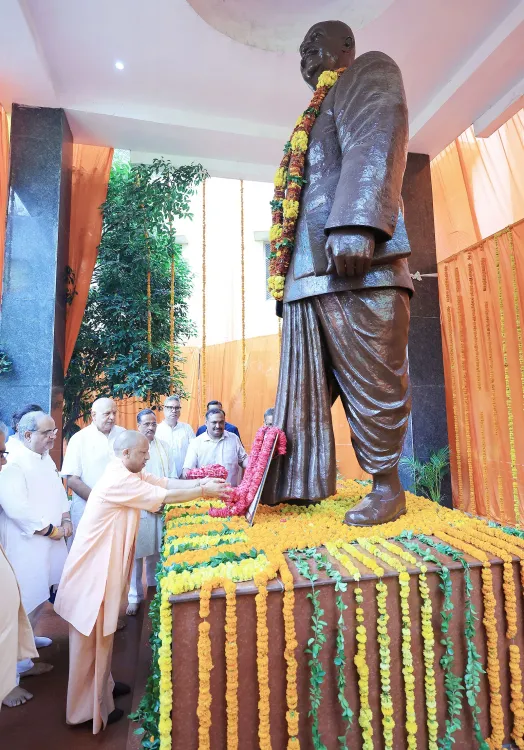Did UP CM Yogi Adityanath Honor Syama Prasad Mookerjee on His Death Anniversary?

Synopsis
Key Takeaways
- Yogi Adityanath honored Syama Prasad Mookerjee on his death anniversary.
- Mookerjee was a significant proponent of a united India.
- His opposition to Article 370 is a critical part of his legacy.
- The abrogation of Article 370 is seen as the realization of Mookerjee's vision.
- PM Modi's leadership is highlighted in fulfilling Mookerjee's dreams.
New Delhi, June 23 (NationPress) Uttar Pradesh Chief Minister Yogi Adityanath paid heartfelt tributes to Syama Prasad Mookerjee on his death anniversary, honoring him as a great son of Bharat Mata whose sacrifices were instrumental in establishing a unified and secure India.
During a floral tribute ceremony in Lucknow for Mookerjee's 'Balidan Diwas', CM Adityanath remarked, "This day in 1953 marks the moment when Syama Prasad Mookerjee gave his life for the nation, advocating for the vision of 'Akhand Bharat'."
Referring to Mookerjee as a visionary leader, the Chief Minister emphasized his role not only as an esteemed educationist and freedom fighter but also as a key figure in laying the ideological groundwork for a robust and united India.
"As a Cabinet Minister in the newly Independent India, he made significant contributions to the nation’s advancement with his forward-thinking perspective. Yet, when he sensed threats to national unity, he didn’t hesitate to step down from the cabinet of the nation’s first Prime Minister, Jawaharlal Nehru," CM Adityanath continued.
Pointing out Mookerjee's pivotal role as the founder and first President of the Bharatiya Jana Sangh, he stated that Mookerjee introduced a novel political stream in India that was deeply rooted in nationalism.
"He staunchly opposed Article 370, which jeopardized the country’s unity. Defying the permit system, he entered Jammu and Kashmir, where he ultimately became a martyr in imprisonment," he elaborated.
Chief Minister Adityanath declared that the repeal of Article 370 in Jammu and Kashmir represents the realization of Mookerjee's long-held aspiration.
"It took our nation nearly 65 years to bring his vision to fruition. The abrogation of Article 370 stands as a testament to Mookerjee’s dream of a united India," he stated.
"Ek Bharat, Akhand Bharat, Surakshit Bharat"—this was Mookerjee's vision, and under Prime Minister Narendra Modi's leadership, it has now been achieved. This is one of PM Modi's most significant accomplishments," the Chief Minister added, asserting that the current administration has finally made Mookerjee's dream a reality after years of struggle.
According to the official website of the Bharatiya Janata Party (BJP), Mookerjee died "for the purpose of integrating Kashmir with the rest of India".
On social media platform X, Prime Minister Modi expressed, "I pay tribute to Syama Prasad Mookerjee on his martyrdom day. He exemplified remarkable courage and dedication to maintaining the nation’s integrity. His invaluable contributions to nation-building will forever be held in high esteem."
BJP President and Union Minister J.P. Nadda also commemorated Mookerjee via social media, stating, "I extend my heartfelt tribute to the blessed son of Mother India, the pioneer of cultural nationalism, revered Shyama Prasad Mukherjee ji on his martyrdom day, who devoted his life for the unity, integrity, and self-respect of India."










